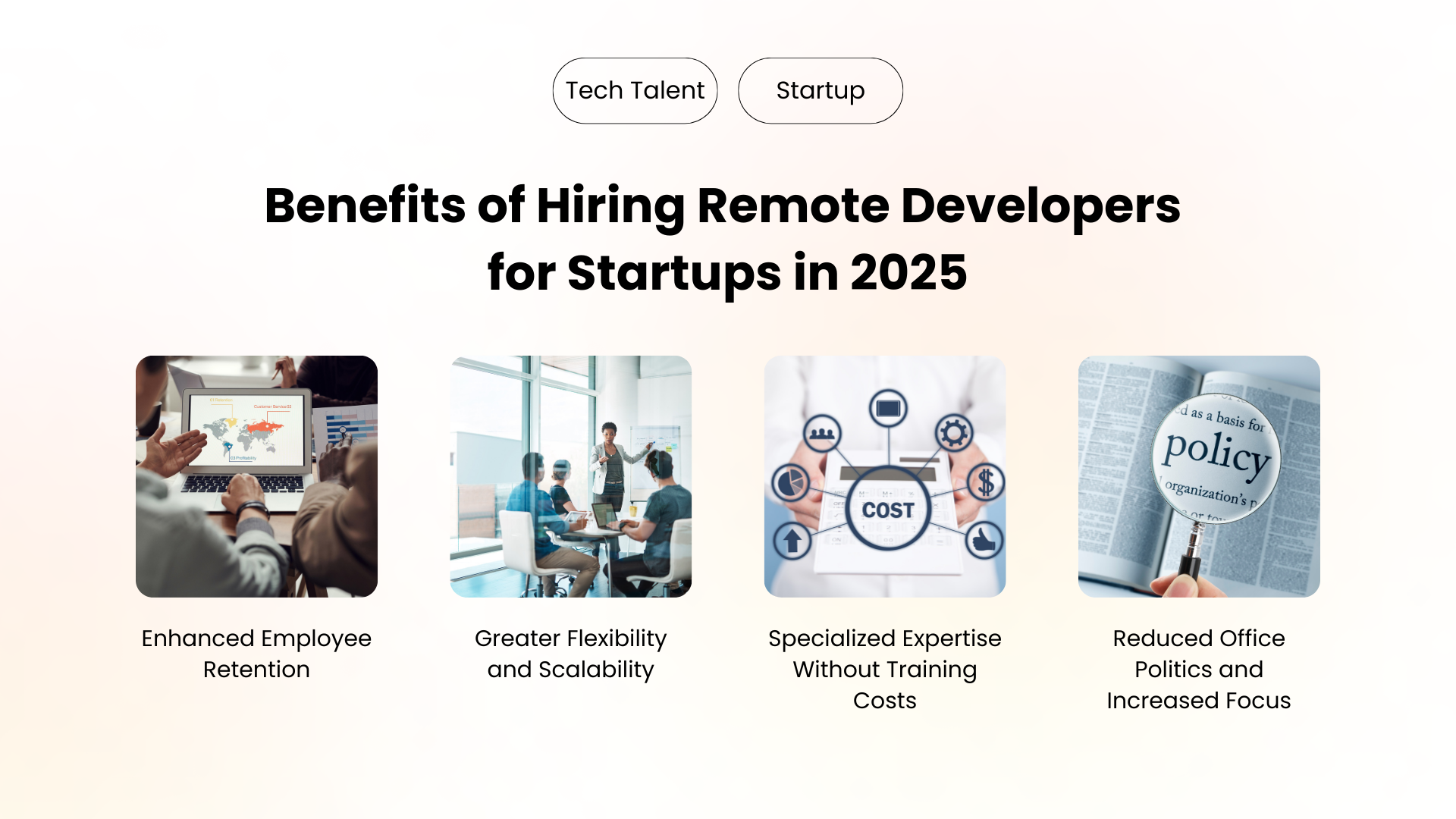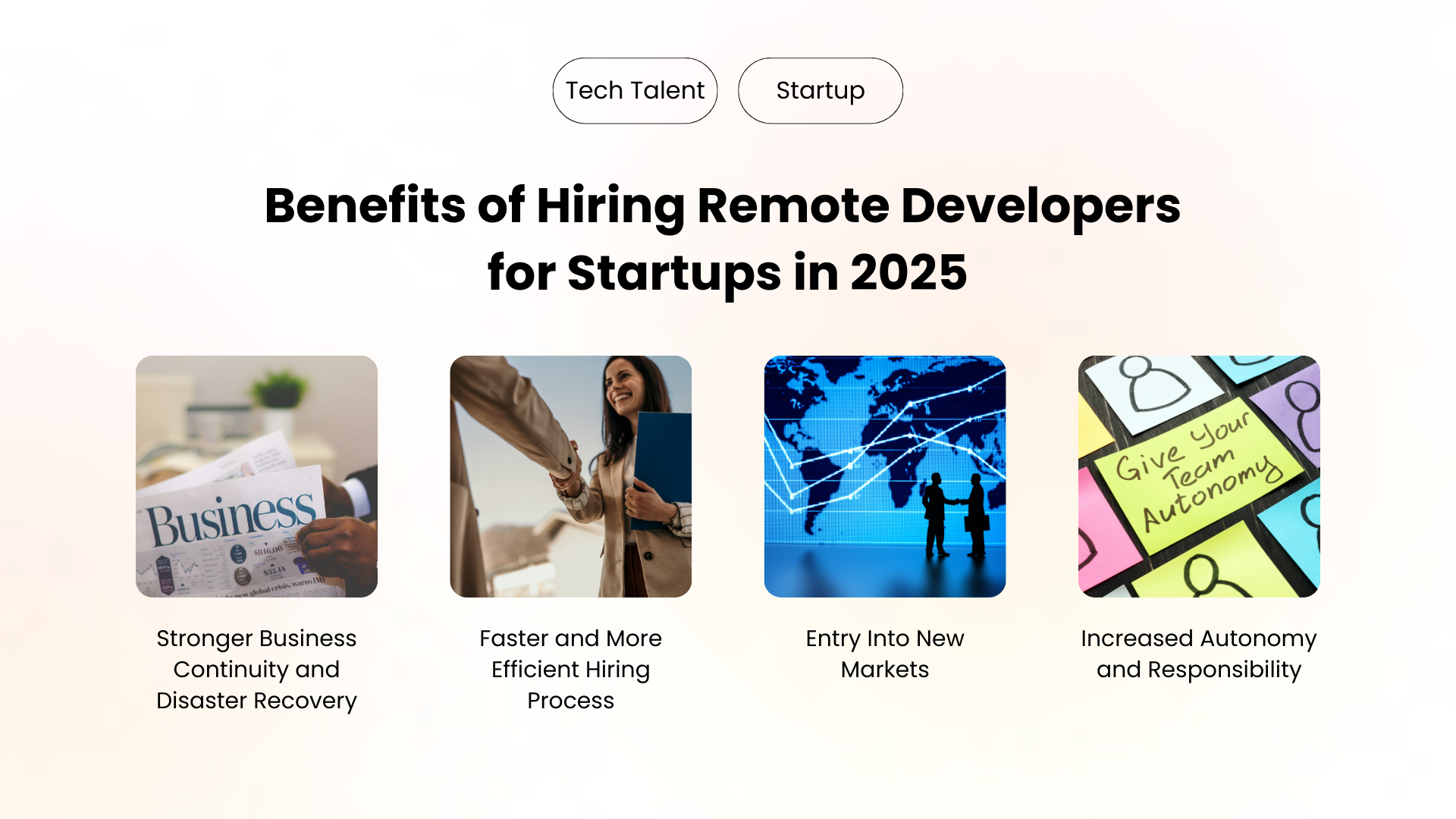As startups look for ways to stay competitive, hiring remote developers has emerged as a game-changer. With the global demand for skilled tech professionals on the rise, remote teams offer an efficient, cost-effective, and scalable solution for businesses aiming to build high-quality products without geographical limitations.
This guide explores the 14 key benefits of hiring remote developers and how they can contribute to your startup’s long-term success.

1. Access to a Global Talent Pool
By hiring remotely, startups can tap into a borderless talent pool, gaining access to highly skilled developers from across the globe. This flexibility allows businesses to find niche expertise in areas such as AI, blockchain, and cybersecurity without being restricted by local availability.
Instead of competing for the same limited pool of talent in high-cost regions, startups can discover specialized professionals with unique skills that align with their specific project needs.
2. Cost Efficiency and Budget Optimization
Hiring remote developers allows startups to save on overhead costs, including office space, equipment, and relocation expenses. Moreover, wages in different regions vary, enabling startups to optimize their budgets while securing high-quality talent.
With the ability to hire from regions with lower living costs, startups can reinvest the savings into areas like product development, marketing, and customer acquisition to fuel further growth.
3. Increased Productivity and Performance
Research suggests that remote employees are more productive due to fewer office distractions and flexible work schedules. Developers can work during their most efficient hours, ensuring faster project turnaround times and enhanced code quality.
By allowing employees to work in environments where they feel most comfortable and productive, startups can benefit from high-quality work, fewer errors, and better overall performance.
4. Faster Time-to-Market
With teams distributed across different time zones, work can continue around the clock. This 24/7 development cycle accelerates product launches, giving startups a competitive edge in bringing their solutions to market more quickly. This means that tasks completed by one team during their working hours can be handed off seamlessly to another team in a different time zone, ensuring a continuous workflow that speeds up project completion.

5. Enhanced Employee Retention
Remote work fosters higher job satisfaction, leading to lower turnover rates. Employees enjoy greater flexibility, improved work-life balance, and reduced commuting stress, resulting in a happier and more committed workforce. A well-balanced work environment translates to better engagement, higher motivation, and increased dedication, reducing the time and costs associated with frequent hiring and training.
6. Greater Flexibility and Scalability
Startups often face fluctuating development needs. Remote hiring enables rapid scaling, allowing companies to quickly onboard or downsize talent based on project demands without the constraints of traditional hiring models. This agility helps startups adapt to market changes and customer demands while maintaining operational efficiency and cost control.
7. Specialized Expertise Without Training Costs
Need a machine learning specialist or an expert in cloud architecture? Remote hiring allows startups to onboard pre-vetted professionals with niche expertise, eliminating the need for costly in-house training programs.
Instead of spending months training local hires, startups can immediately access seasoned experts who bring years of experience and industry knowledge to the table.
8. Reduced Office Politics and Increased Focus
Remote teams minimize workplace distractions such as office politics, unproductive meetings, and unnecessary bureaucracy. Developers can focus solely on their work, driving efficiency and innovation.
Without the typical office dynamics that can hinder productivity, remote developers are more likely to stay motivated and engaged in their tasks, leading to better overall outcomes.

9. Stronger Business Continuity and Disaster Recovery
Distributed teams ensure that work continues uninterrupted during unexpected disruptions, such as local power outages, natural disasters, or office closures. Having a global workforce enhances operational resilience. By maintaining a diversified team across different locations, startups can mitigate risks associated with regional disruptions and ensure steady business operations.
10. Faster and More Efficient Hiring Process
Traditional hiring cycles can take months, but remote hiring shortens the process by removing location constraints. Startups can find and onboard top talent within days, allowing for quicker project execution. With access to global hiring platforms, businesses can easily connect with pre-vetted developers, reducing recruitment lead time and ensuring swift team assembly.
11. Entry Into New Markets
Having remote developers across different regions provides valuable insights into international markets. They can help tailor your product to different cultures, languages, and regulatory landscapes, accelerating global expansion efforts. Understanding local market dynamics can improve localization efforts, making it easier to attract and retain customers in diverse regions.
12. Increased Autonomy and Responsibility
Remote developers operate with greater independence, fostering a culture of accountability. This autonomy encourages proactive problem-solving and ownership over projects, leading to more innovative solutions. Employees who have the freedom to manage their work effectively are often more engaged, leading to higher-quality output and stronger project execution.

13. Better Work-Life Balance and Mental Well-Being
A remote work model allows employees to structure their days in ways that improve mental well-being and job satisfaction. Happier developers lead to higher engagement and improved collaboration within teams. By eliminating long commutes and rigid office hours, remote work supports a healthier lifestyle, which in turn enhances performance and reduces burnout.
14. Building a Diverse and Inclusive Workforce
By hiring remote developers, startups can build a more diverse and inclusive team, incorporating different perspectives and approaches that drive creativity, innovation, and better problem-solving. Diversity fosters a richer exchange of ideas, leading to more robust solutions and stronger business performance in an increasingly globalized economy.
Key takeaways
Hiring remote developers presents startups with numerous benefits, from cost savings and talent accessibility to increased productivity and global expansion opportunities. By adopting the right hiring strategies and leveraging remote work best practices, startups can build high-performing teams that drive innovation and success.
About Innovators Hub Asia
Innovators Hub Asia is an innovative technology system that combines 2,000 top innovators and tech talents and cutting-edge technology to deliver AI-driven solutions tailored to the business’s unique challenges. It aims to revolutionize business operations and accelerate growth through a wide range of services, including aiLabs, TalentCloud, Tech Venture Builder, and Co-Innovation Builder.






